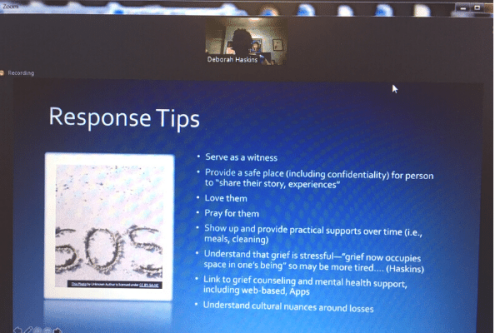Offering reassurance in time of pandemic

A screenshot from the Training Tuesday webinar, April 7.
By Erik Alsgaard
What people need the most, right now, during a global pandemic, is reassurance that we will get through this. That’s the job of clergy and lay leaders throughout the Baltimore-Washington Conference, according to Deborah Haskins, a licensed counselor and president of the Maryland Council on Problem Gambling, who presented her thoughts on the April 7 Training Tuesday webinar.
The webinar, “To Serve in this Present Age: Leading and Serving in the Midst of Trauma and Grief,” drew nearly 100 people to learn how to more effectively minister during this crisis. Watch the webinar here.
“We need this reassurance,” Haskins said, “because when you’re caught up in the trauma, the grief, the adversity, you don’t really believe that you’ll breathe through this. But we will get through this because God has already promised us. We have lived through slavery, the Depression, the Holocaust; we have gotten through.”
Haskins, the widow of the Rev. Bruce Haskins, an Elder in the BWC who died in 2016, shared about her own personal grief and trauma. In a short time span, her son was murdered, her cousin was shot and killed, and her husband died after a long illness.
Learning more about grief, pain, and trauma is key to understanding how to help, Haskins said, because what they do is make it hard for people to remember to breathe. And that, for her, is the place where healing begins: breathe.
Haskins encouraged participants of the webinar to “just breathe.” She invited people to close their eyes, center themselves, and … just … breathe.
“I’m not worrying about tomorrow,” she said. “I’m not worried about today. I’m not looking back at yesterday or last week. All I need to do right now is take a breath.”
And another. And another.
Clergy, especially, can help with this simply by showing up and being present, even if it’s just a phone call or using video calls. They can be a conduit for to combat isolation, provide connection, offer support, and share God’s love.
“My hope and my prayer are that you’ll become more empathic and more understanding,” she said to the participants. “Because all of us are being called to act as a witness.”
A witness, Haskins said, provides a safe place for a person to share their story and experience. It can sometimes be painful to be a witness, but their job is to love the person, pray for them, and offer practical support over time. A witness’s job is not to try and manage the grief or trauma, she said.
What clergy also need during this time is stress management.
“Limit the stimuli that you’re exposed to in terms of all the triggers,” she said. “Don’t watch the news to the same degree; don’t be inundated with all that; shut it down. Limit the ways that (the pandemic) is triggering your own anxiety. Limit the people, places, or things that trigger you to be more upset, be more anxious, to be feeling less hopeful, and surround yourself with the supportive mechanisms that help you to breathe the most.
Trauma, Haskins said, is defined as a stress or event that threatens our perception of safety or security. When people experience trauma, it is overwhelming and creates a new reality where the survivors often don’t feel safe. They also, often, begin to question the world because they don’t feel safe in the world.
In other words, trauma is the “normal response to an abnormal event,” Haskins said.
“A traumatic event,” she said, “often involves a threatened or actual death, or a serious injury … or a threat to the well-being of ones-self or another person.”
The coronavirus pandemic, she said, is a crisis that is also introducing trauma. The great unknown right now is how this pandemic, once it is done, will affect people, both spiritually and psychologically.
“People are questioning the world and it’s going to change how people look at how they can function in the world as we move forward.”
The question she and other clinicians are hearing: “’Who am I now?’ Because the trauma is so profound, it alters who we are.”
One of the questions during the webinar was poignant. “How do we, as pastors, help others when we, as pastors, are also part of the loss?”
Haskins answered that it is important for pastors to stay in touch with their congregation. She also suggested that congregations have regular check-in times with the pastor on a consistent, on-going basis, about community, about grief and loss, and about joy and blessing.
“The more that we can give witness to (this pandemic), the better that people will name it,” Haskins said.
Haskins also urged her listeners to intentionally check in on the children and youth of their church and offer ways for them to stay connected. Because schools are closed, and because they are often the place of social, in-person connection, their worlds have also been turned upside down. Create a list of families with children, she suggested, and make sure to check in on them regularly.
TO SERVE IN THIS PRESENT AGE: LEADING AND SERVING IN THE MIDST OF TRAUMA AND GRIEF
PRESENTED BY DR. DEBORAH HASKINS
Individuals, families, and communities experience trauma and losses (often multiple), including adverse childhood experiences (ACEs). They often struggle with healing the emotional and spiritual "fall out" from these traumatic events. What happens when there is complicated trauma and grief, including homicidal loss, police brutality, frequent community violence? In this session, you will learn how to journey with persons experiencing grief, loss, and trauma and offer hope as part of your mission to transform lives.
Additional Resources:
Resource Description_Pair of ACEs Tree
The Baltimore-Washington Conference offers numerous resources for clergy, laity, and congregations in this time of the coronavirus pandemic. Click here.
